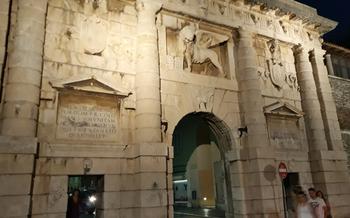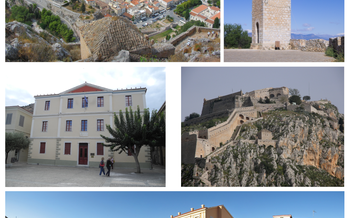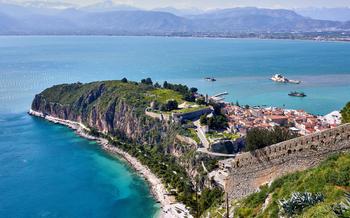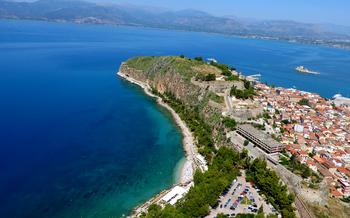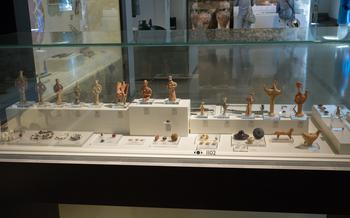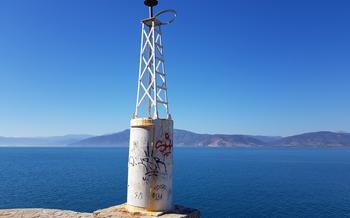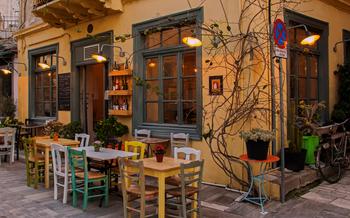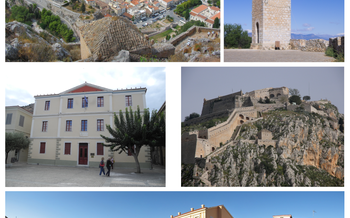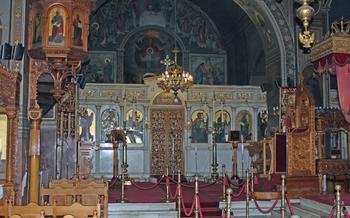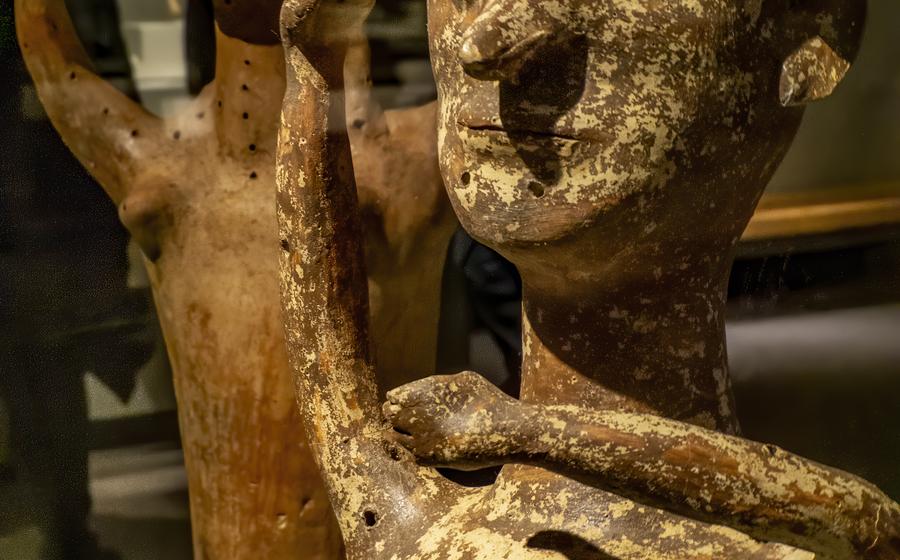
Oenoe Museum of Wine and Vinegars
- A Journey into Dionysus' Realm
- Location and Accessibility
- Hours of Operation and Admission Fees
- Interactive Exhibits and Displays
- Winemaking Techniques through the Ages
- Vinegar Production and Uses
- Wine and Vinegar Tasting
- Winemaking Equipment and Tools
- Historical Artifacts and Documents
- Cultural Significance of Wine
- Local Viticulture and Wine Industry
- Educational Programs and Workshops
- Museum Shop and Souvenirs
- Accessibility for Visitors with Disabilities:
- Insider Tip:
A Journey into Dionysus' Realm
Nafplio, a picturesque city in the Peloponnese region of Greece, is renowned for its rich history, stunning landscapes, and vibrant culinary scene. Among its many attractions, the Oenoe Museum of Wine and Vinegars stands out as a unique and immersive experience that takes visitors on a journey into the realm of Dionysus, the Greek god of wine.
The museum is housed in a beautifully restored 19th-century building, once a wine warehouse, and offers a comprehensive exploration of the region's vinicultural heritage. Through interactive exhibits, multimedia presentations, and hands-on activities, visitors can delve into the history, culture, and traditions of winemaking in Nafplio.
Myths and legends surrounding Dionysus, the patron deity of wine, viticulture, and revelry, are intricately woven into the museum's narrative. Visitors can discover the tales of Dionysus' birth, his travels, and his gift of wine to humanity, gaining insights into the profound significance of wine in ancient Greek culture.
Grapes and wine held a sacred place in ancient Greece, symbolizing abundance, fertility, and joy. The museum showcases the various ways in which wine was incorporated into religious rituals, festivals, and everyday life, highlighting its role as a libation to the gods, a source of sustenance, and a symbol of hospitality.
Location and Accessibility
The Oenoe Museum of Wine and Vinegars is situated in the heart of Nafplio, a picturesque city in the Peloponnese region of Greece. It is housed in a historic building on Vasileos Alexandrou 14, just a short walk from the city's main square, Syntagma Square. The museum's central location makes it easily accessible on foot or by public transportation. For those arriving by car, limited street parking is available in the vicinity.
If you're exploring Nafplio's other attractions, you'll find the Oenoe Museum conveniently placed amidst various historical sites and cultural landmarks. The nearby Palamidi Fortress, Bourtzi Castle, and Archaeological Museum of Nafplio are all within walking distance, allowing you to combine your visit to the museum with a comprehensive tour of the city's rich heritage.
Hours of Operation and Admission Fees
The Oenoe Museum of Wine and Vinegars welcomes visitors during the following hours:
- Summer Season (April 1 - October 31): Tuesday to Sunday, 10:00 AM to 6:00 PM
- Winter Season (November 1 - March 31): Wednesday to Sunday, 10:00 AM to 4:00 PM
The museum remains closed on Mondays and major holidays. It is advisable to check the museum's official website or contact them directly for any updates or changes in the schedule.
Admission fees are as follows:
- Adults: €00
- Seniors (65+): €00
- Students: €00
- Children (under 12): Free
The museum offers discounted rates for groups of 10 or more visitors. Online booking is available through the museum's website, allowing visitors to secure their tickets in advance and avoid queues.
Interactive Exhibits and Displays
The Oenoe Museum offers a captivating journey through the history of winemaking, employing multimedia presentations and interactive displays that bring the exhibits to life. Visitors can engage with touch screens to explore the evolution of winemaking techniques, watch videos showcasing traditional methods, and delve into the sensory experience of wine. Aroma stations allow visitors to identify different wine aromas, while taste testing sessions provide the opportunity to sample a variety of local wines and vinegars. The museum's educational programs and workshops offer deeper insights into the world of wine, covering topics such as wine tasting, winemaking techniques, and wine appreciation.
Winemaking Techniques through the Ages
The Oenoe Museum provides a fascinating journey through the evolution of winemaking techniques, from the traditional methods employed in ancient Greece to the modern practices adopted by local wineries. Visitors can learn about the ancient Greeks' use of clay amphorae for fermentation and storage, as well as the introduction of wooden barrels during the Byzantine era.
The museum also showcases the transition to stainless steel tanks and other modern equipment in the 20th century, which allowed for more precise temperature control and improved wine quality. Interactive displays allow visitors to compare the different methods and understand their impact on the final product.
A particular highlight is the hands-on demonstration of traditional winemaking techniques, where visitors can participate in grape pressing and learn about the importance of factors such as grape variety, climate, and soil in shaping the character of the wine.
Vinegar Production and Uses
Vinegar, a staple ingredient in Greek cuisine, plays a vital role in the region's culinary and cultural heritage. The Oenoe Museum of Wine and Vinegars offers a comprehensive exploration of the art and science of vinegar production. Visitors can learn about the traditional processes of converting wine into vinegar, including fermentation and aging techniques. The museum showcases a variety of vinegars crafted from different grape varieties, each with its unique flavor profile and culinary applications.
Vinegar's culinary versatility extends beyond salad dressings and marinades. In Greek cuisine, vinegar is used to add depth and complexity to a wide range of dishes, from stews and soups to grilled meats and seafood. Its acidity enhances flavors, tenderizes proteins, and balances the richness of traditional Greek dishes.
Beyond its culinary uses, vinegar has been recognized for its health benefits. The museum highlights the role of vinegar in promoting gut health, aiding digestion, and reducing cholesterol levels. Visitors can learn about the different types of vinegar, such as red wine vinegar, white wine vinegar, and balsamic vinegar, and their respective health properties.
The Oenoe Museum provides a comprehensive understanding of the history, production, and culinary uses of vinegar, making it a must-visit destination for anyone interested in the rich culinary traditions of Greece.
Wine and Vinegar Tasting
The Oenoe Museum offers guided tastings of local wines and vinegars, providing visitors with an opportunity to sample the region's finest vintages and flavors. Expert sommeliers lead these tastings, sharing their insights into the wines' characteristics, production methods, and food pairing suggestions.
Visitors can savor a variety of wines, from crisp whites to rich reds, each showcasing the unique terroir and grape varieties of Nafplio. The museum's collection also includes a range of vinegars, from traditional balsamic to infused varieties, offering a culinary adventure for those seeking new taste experiences.
Whether you're a wine enthusiast or simply curious to learn more about the art of winemaking, the Oenoe Museum's tasting sessions offer a delightful and informative experience. Reservations are recommended to ensure a spot, especially during peak tourist season.
Winemaking Equipment and Tools
The Oenoe Museum of Wine and Vinegars houses an impressive collection of traditional winemaking tools and equipment, providing visitors with a glimpse into the ancient art of winemaking. These artifacts, which date back centuries, offer insights into the ingenuity and resourcefulness of early winemakers.
On display are various types of presses, including the traditional screw press and the lever press. These presses were used to extract the juice from the grapes, a crucial step in the winemaking process. Visitors can also see traditional wooden barrels, used for fermentation and storage, and amphorae, the clay vessels used by the ancient Greeks to store and transport wine.
Each tool is accompanied by detailed explanations of its functions and significance, allowing visitors to understand the evolution of winemaking techniques over time. Interactive displays and hands-on demonstrations further enhance the visitor experience, providing a deeper understanding of the processes involved in winemaking.
Historical Artifacts and Documents
The Oenoe Museum houses a captivating collection of historical artifacts and documents that narrate the rich story of wine in Nafplio and the surrounding region. Ancient amphorae, with their elegant shapes and intricate designs, stand as testaments to the time-honored tradition of winemaking in the area. These vessels, once used to store and transport wine, offer a glimpse into the methods and techniques employed by ancient winemakers.
Historical documents and manuscripts, carefully preserved within the museum's archives, provide invaluable insights into the practices, beliefs, and rituals associated with wine in ancient Greece. These documents, penned by historians, philosophers, and poets, shed light on the cultural significance of wine, its role in religious ceremonies, and its use as a symbol of hospitality and prosperity.
Archaeological findings unearthed from various sites in Nafplio and the surrounding region further enrich the museum's collection. These artifacts, including wine presses, fermentation vats, and drinking vessels, provide tangible evidence of the importance of wine in ancient Greek society. Interactive displays, employing cutting-edge technology, showcase the evolution of wine labels and packaging, tracing the changing aesthetics and marketing strategies used to promote wine throughout history.
Cultural Significance of Wine
Wine has played a pivotal role in Greek culture for millennia, deeply embedded in mythology, religion, and everyday life. In ancient Greece, wine was considered a sacred beverage, associated with the god Dionysus, the patron of wine, revelry, and fertility. Dionysus' festivals, known as Bacchanalia, were exuberant celebrations involving wine, music, and dance, honoring the deity's transformative power. Wine was also a symbol of hospitality, offered to guests as a gesture of welcome and friendship. In Greek mythology, wine was believed to possess magical properties, capable of bringing joy, inspiration, and even immortality.
Today, wine continues to hold a special place in Greek culture. It is an integral part of religious ceremonies, particularly in the Greek Orthodox Church, where wine is used during Holy Communion, symbolizing the blood of Christ. Wine is also a staple of the Mediterranean diet, enjoyed with meals, celebrations, and social gatherings. Its health benefits, such as reducing the risk of heart disease and improving cognitive function, are widely recognized. Wine is deeply intertwined with Greek identity, representing the country's rich history, traditions, and convivial spirit.
Local Viticulture and Wine Industry
Nafplio, nestled in the heart of the Peloponnese, is surrounded by a tapestry of verdant vineyards, each contributing to the region's rich vinicultural heritage. The favorable climate, characterized by warm, sunny days and cool nights, coupled with the diverse soil composition, provides an ideal terroir for grape cultivation.
The region boasts a variety of indigenous grape varieties, each expressing the unique characteristics of the land. Among the most prominent are the red Agiorgitiko, known for its vibrant color and fruity flavors, and the white Moschofilero, prized for its delicate aromas and crisp acidity. These grapes, along with international varieties such as Cabernet Sauvignon, Merlot, and Chardonnay, thrive in the region's microclimates, producing wines of exceptional quality and distinction.
Visitors to Nafplio have the opportunity to explore the surrounding wine-growing areas, dotted with charming wineries and vineyards. Notable wineries include the Tselepos Winery, known for its organic and biodynamic practices, and the Palivos Winery, renowned for its award-winning vintages. These wineries offer guided tours, tastings, and the chance to learn about the winemaking process from passionate local producers.
Throughout the year, Nafplio and the surrounding region host a variety of wine festivals and events, showcasing the best of the local viticulture. The Nafplio Wine Festival, held annually in the picturesque Old Town, is a vibrant celebration of wine, music, and local cuisine, attracting wine enthusiasts from across the country.
Whether you're a seasoned wine connoisseur or simply curious about the art of winemaking, Nafplio offers a plethora of opportunities to delve into the world of wine, discover the local viticulture, and savor the flavors of the region's exceptional vintages.
Educational Programs and Workshops
The Oenoe Museum offers a range of educational programs and workshops to further immerse visitors in the world of wine and vinegar. These programs are designed for wine enthusiasts, aspiring sommeliers, and anyone interested in delving deeper into the art and science of winemaking.
Enthusiastic experts conduct wine education courses that cover a variety of topics, including wine tasting techniques, the history of winemaking, and the characteristics of different grape varieties.
Visitors can also participate in hands-on workshops where they can learn the intricacies of winemaking and vinegar production firsthand. These workshops offer a unique opportunity to gain practical experience under the guidance of skilled professionals.
Whether you're a novice or a seasoned connoisseur, the Oenoe Museum's educational programs provide an enriching and engaging way to expand your knowledge of wine and vinegar.
Museum Shop and Souvenirs
The Oenoe Museum houses a well-stocked museum shop where visitors can purchase a variety of wine-related souvenirs and products to commemorate their visit and take a piece of Nafplio's wine culture home.
Local wines and vinegars produced by wineries in the region are available for purchase, allowing visitors to savor the flavors of Nafplio's vinicultural heritage. Additionally, the shop offers a selection of regional specialties, such as olive oil, honey, and traditional sweets, providing visitors with the opportunity to support local businesses and sample the culinary delights of the area.
Wine-themed gifts, such as books, accessories, and homeware, are also available in the museum shop. These items make for thoughtful souvenirs for wine enthusiasts and can serve as a reminder of the rich winemaking traditions of Nafplio.
Whether you're a wine connoisseur or simply looking for a unique gift, the Oenoe Museum shop has something to offer. By making a purchase, visitors can not only support the museum's ongoing efforts to preserve and promote the region's winemaking heritage but also take home a piece of Nafplio's liquid history.
Accessibility for Visitors with Disabilities:
The Oenoe Museum of Wine and Vinegars is committed to providing an inclusive and accessible experience for all visitors, regardless of their abilities. The museum is wheelchair accessible, with ramps and elevators ensuring that all exhibits and facilities are easily accessible. Braille signage and audio guides are available for the visually impaired, allowing them to fully engage with the museum's exhibits. Additionally, the museum offers special programs and events designed specifically for visitors with disabilities, ensuring that everyone has the opportunity to learn about and appreciate the rich history of wine and vinegar in Nafplio.
Insider Tip:
To fully immerse yourself in the wine culture of Nafplio, plan your visit during the annual Grape Harvest Festival, typically held in September. This vibrant celebration showcases the region's viticulture and winemaking traditions, offering visitors the chance to witness grape picking, traditional winemaking demonstrations, and lively festivities. Don't miss the opportunity to savor freshly pressed grape must, indulge in local delicacies paired with regional wines, and experience the infectious energy of this joyous event. For a truly unforgettable experience, consider joining a guided wine tour of the surrounding vineyards, where you can learn about local winemaking practices, sample a variety of vintages, and soak in the breathtaking scenery.

